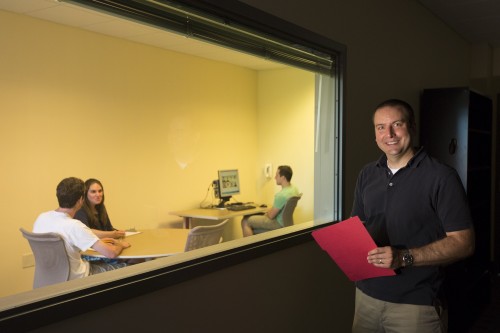Understanding the Mind Through the Lens of the Heart
A strong science foundation and a culture of compassion guide psychology graduates to success in clinical and non-clinical careers.
One of the many lessons Corey Roos ’10 took from four years as a Stonehill psychology major was not conveyed in a classroom but at the College’s Counseling Center. “I felt a spirit of compassion when I visited the center as a client,” he explains. “I came to understand the power of mindfulness, which steered me toward that research emphasis.”
Roos went on to earn a Ph.D. from the University of New Mexico and today merges mindfulness and addiction research as an assistant professor of psychiatry at the Yale School of Medicine.
With a National Institutes of Health grant, he is studying the effectiveness of a mindfulness app he developed to support individuals recovering from substance use disorders. He hopes to make the app free and widely available to expand access to recovery support.
“Stonehill shows you how to harness both academic rigor and compassion through research,” says Roos. “I try to conduct studies with direct service to the community in mind.”
Roos’ research-focused career pathway is just one of myriad opportunities for Stonehill psychology majors. The program is purposefully flexible to help students align courses with their chosen pathway. “Ultimately, each student graduates with a transcript uniquely tailored to their individual goal,” explains Mike Tirrell, chair of the Psychology Department.
Certain Stonehill essentials — such as the spirit of compassion Roos experienced — underpin the program. Its breadth of specialization opportunities is supported by close advising by faculty who themselves bring a wealth of varied educational and professional points of view. Students meet frequently with advisors to confirm that their courses align with their goals, even as those goals evolve. “It’s a much more personalized education than a large university can accommodate,” adds Tirrell.
Resume-Enhancing Experience Emphasized
The psychology program at Stonehill not only encourages research experience, but requires it. Each student completes a course in research methods, then identifies a research topic, collects and analyzes data, and develops a formal American Psychological Association-style article or presentation. Psychology majors may also choose to get real-world-experience by completing an internship at one of Stonehill’s many partner sites.
Opportunities abound for further independent or faculty-guided research projects, and an externship program pairs students with clinicians and researchers at Brown University, UMass Chan Medical School and the Brockton Veterans Affairs system. Many students graduate with transferable clinical experience or co-authored research — valuable assets for a job search or graduate school application.
Caitlyn Bowen ’22, who will start a doctorate of clinical psychology program this fall at Nova Southeastern University, credits her Stonehill professors and advisor for helping her find her footing in work with adolescents and young adults dealing with eating disorders and depression. With their help, she secured two years’ work as a research assistant at Brown University, where she co-authored research examining the impact of COVID-19 on substance use treatment clinics.
Where Research Meets Service
It is that level of research rigor and support that led Georgia Winters ’13 to build on her undergraduate thesis — understanding grooming behaviors in order to prevent child sexual abuse — through and beyond her Ph.D. program at the John Jay School of Criminal Justice. Currently an assistant professor in the forensic psychology master’s program at Fairleigh Dickinson University, Winters will soon step into the role of program director, teaching master’s-level courses and coordinating student externships.
Winters says the passion of her Stonehill professors and the College’s emphasis on service and social justice have fueled her own teaching and research accomplishments. “So much of Stonehill’s values center on supporting others, which in my work means trying to prevent victimization before it occurs,” she explains. “Professors incorporate those values into their teaching. You’re held to high standards in all ways and given the tools to succeed.”
Caitlyn Bowen ’22, will be attending the doctorate of clinical psychology program at Nova Southeastern University in the fall
Georgia Winters ’13, assistant professor and co-director, forensic psychology program at Fairleigh Dickinson University
Defining a Clinical Career
Tirrell notes that the study of psychology imparts critical thinking skills and an understanding of human behavior and diverse thinking — all assets in a wide range of careers. Many Stonehill students pair psychology with a double major such as criminology or education, often leading to an array of non-clinical careers in areas such as human resources, coaching, research, and teaching.
For Tamara Perkoski ’97, a double major in psychology and Spanish ultimately reinforced her inclination toward a clinical career. An internship at the Old Colony YMCA provided “unparalleled” direct experience with clients that helped further direct her to work with children and families. After completing a Psy.D. program in psychology, she came full circle, counseling Stonehill students as part of her postdoctoral training with a group practice in Easton. Today, Perkoski maintains a private practice and is part of an innovative pediatrics practice in Foxboro that embeds behavioral health in primary care.
“Stonehill set the stage for my future,” she says. “It provided both the knowledge I needed to define my path forward and the space for me to grow in a community of shared values so I had the confidence to continue down that path.”
Tamara Perkoski ’97, clinical psychologist


